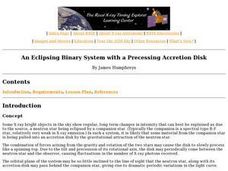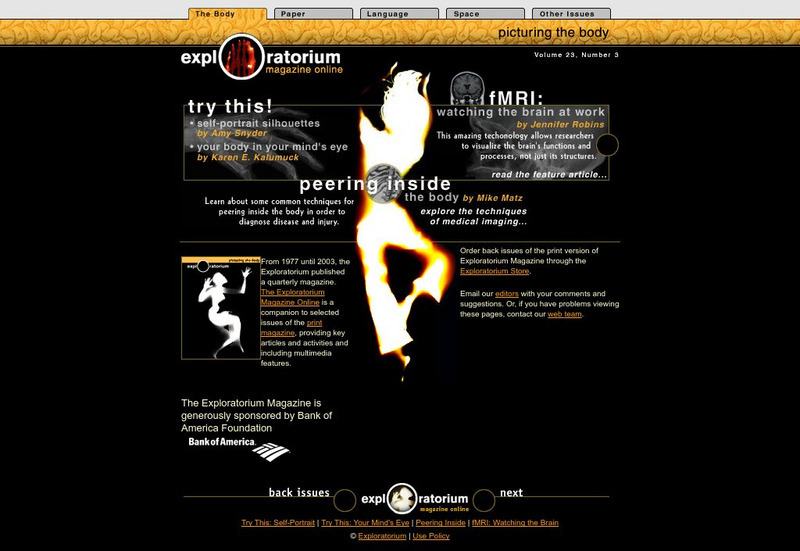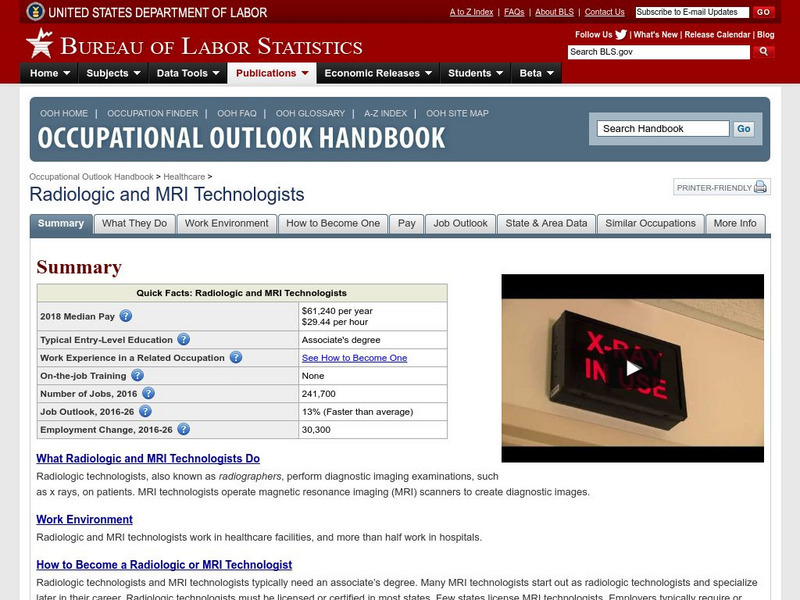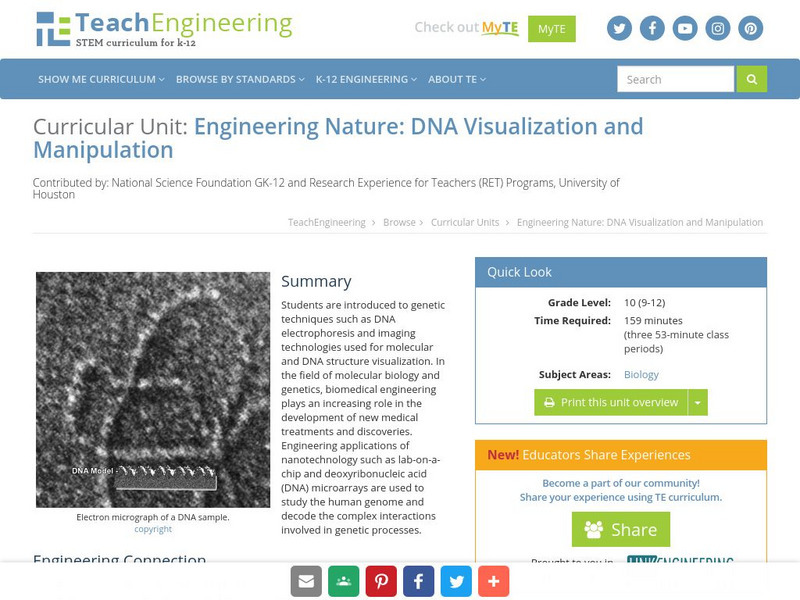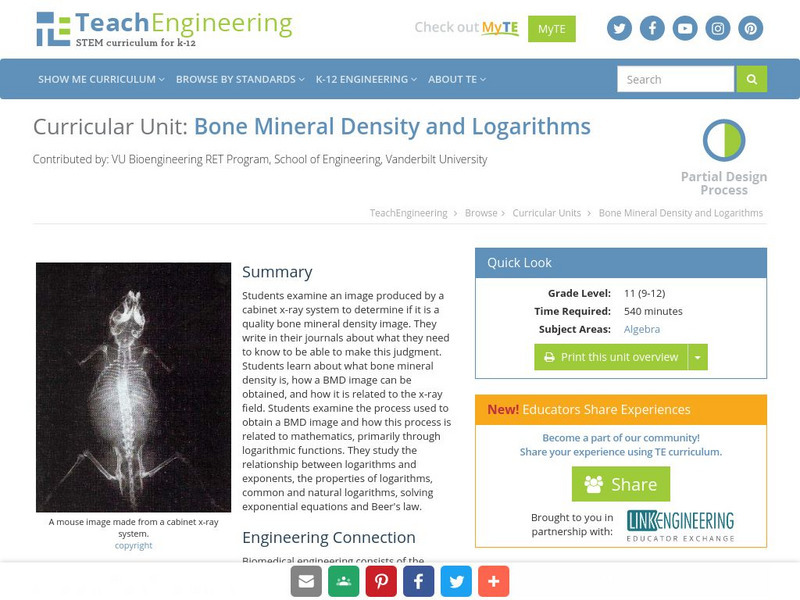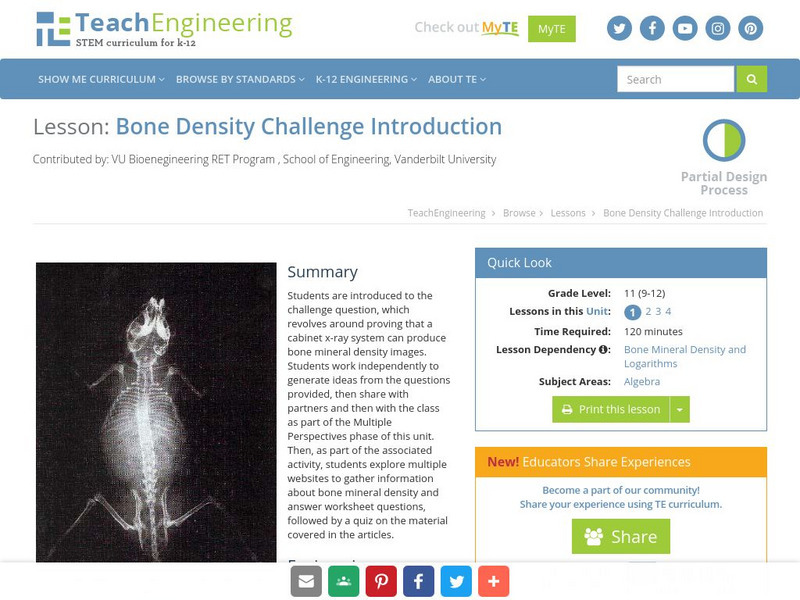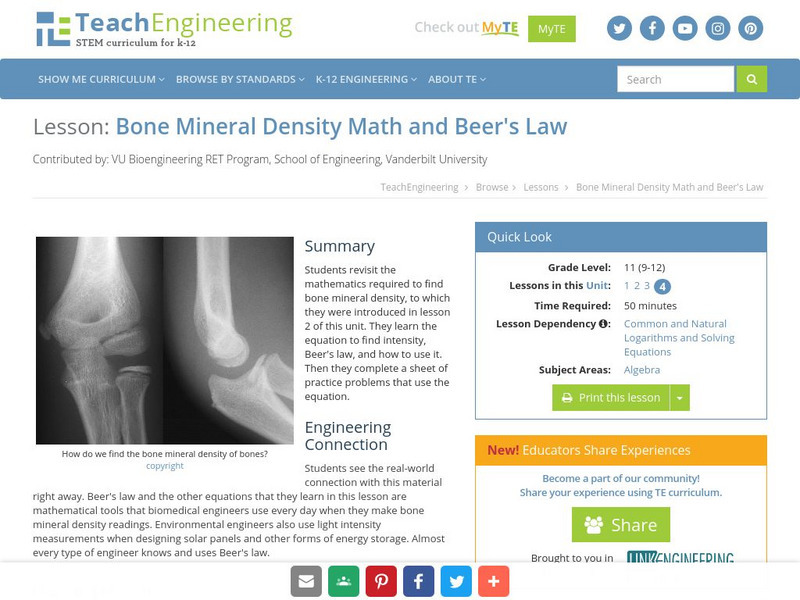Curated OER
X-Ray Eyes
Learners observe Australian X-ray paintings for information and to understand the art techniques used. Then they imagine and draw the inner organs of an animal. Students also research the anatomy of the animal to analyze the accuracy of...
Curated OER
Stars and Slopes
More of a math lesson than physics or space science, high schoolers take a set of data and plot it on a log-log coordinate system. The write-up for day two was never completed, but day one, "Stars and Slopes," is complex and cohesive....
Curated OER
What Wavelength Was That?
A combination of informative text, photos, and graphics comprise this sharp show on electromagnetic radiation. Some slides mention hands-on activities for demonstrating concepts, so if you want to include them you will need to figure out...
Curated OER
Make Your Own "Weather" Map
High schoolers create their own "weather" map using data from x-ray sources. They analyze and discuss why it is important to organize data in a fashion in which is easy to read. They compare and contrast different x-ray sources using a...
Curated OER
A Journey of Discovery with RXTE
Students complete different missions to examine the topic of x-ray sources. They use satellite images and websites to gather the information they need to complete the lesson. They complete a worksheet to end the lesson.
Curated OER
An Eclipsing Binary System with a Precessing Accretion Disk
Young scholars work together to complete an experiment over binary sources. They determine values for the orbital period of certain objects and interpret intensity changes. They also calculate a value for the period of precession of an...
Exploratorium
Exploratorium: Picturing the Body
An online version of articles and activities from the Exploratorium Magazine, Vol. 23, No. 3. This issue looked at how we are able to examine the inside of the human body, what kinds of technology are used, and how each of them is used...
Aetna Intelihealth
Aetna: Inteli Health: Mammography
Thorough overview of mammography. Includes information on what it's used for, how it's done, its risks, and much more.
US Department of Labor
Bureau of Labor Statistics: Radiologic Technician
Published by the Department of Labor, this site details the Radiologic Technician Career. Employment outlook, and projections are provided with training and qualifications data.
University of Colorado
University of Colorado: Physics 2000: Cat Scans: Projecting Shadows
This page and the three pages which follow discuss how X-ray technology can be used to produce an image of the human body. Discussion is understandable and highly intriguing. Several interactive animations allow the visitor to explore...
PBS
Pbs: People & Discoveries: Ernest Rutherford
A lovely biographical piece about Ernest Rutherford. A number of personal notes, along with extensive information about the physics work he did. Nice quote at the end.
CK-12 Foundation
Ck 12: Structure of the Atom
[Free Registration/Login may be required to access all resource tools.] Students learn about the important discoveries of subatomic particles, and how they led to our current understanding of the atom.
TeachEngineering
Teach Engineering: Exploring Bone Mineral Density
In this activity, students will explore two given websites to gather information on Bone Mineral Density and how it is measured. They will also learn about X-rays in general, how they work and their different uses, along with other...
TeachEngineering
Teach Engineering: Engineering Nature: Dna Visualization and Manipulation
Students are introduced to genetic techniques such as DNA electrophoresis and imaging technologies used for molecular and DNA structure visualization. In the field of molecular biology and genetics, biomedical engineering plays an...
TeachEngineering
Teach Engineering: Bone Mineral Density and Logarithms
Students examine an image produced by a cabinet x-ray system to determine if it is a quality bone mineral density image. Students write in their journals about what they need to know to be able to make this judgment. Students learn about...
TeachEngineering
Teach Engineering: Bone Density Challenge Introduction
Learners are introduced to the challenge question, which revolves around proving that a cabinet X-ray system can produce bone mineral density images. Students work independently to generate ideas from the questions provided then share...
TeachEngineering
Teach Engineering: Bone Mineral Density Math and Beer's Law
In this lesson students revisit the mathematics required to find bone mineral density, to which they were introduced in Lesson 2. They will learn the equation to find intensity and how to use it. There is a sheet of practice problems...
University of Colorado
University of Colorado: Physics 2000: Electromagnetic Waves
Using a student-teacher dialogue format, this page discusses the nature of light as an electromagnetic wave and the electromagnetic spectrum.
The Franklin Institute
Franklin Institute: The Case Files: History of Energy
An early history and biographies of the most prominent scientists involved in developing the main sources of energy used in the twentieth century.
Nobel Media AB
The Nobel Prize: The Nobel Prize in Physics 1935 Presentation Speech
The Nobel Physics Chairman made this speech when presenting the Prize to Chadwick. It clearly explains the importance and depth of Chadwick's work. Site by Nobel e-Museum.
Harvard University
Smithsonian Astrophysical: Chandra X Ray Observatory
Chandra X-Ray Observatory is an space observatory designed to detect x-rays. The public web site gives information about Chandra and X-ray astronomy in general (in field guide). It also gives educational materials for teachers.
Emory University
Emory University: Something About X Rays for Everybody
A summary of a century of research regarding X-rays. Discusses the discovery and applications of X-rays. Includes some ideas for exploring and investigating X-rays.
Georgia State University
Georgia State University: Hyper Physics: Relativistic Energy
A mathematically understandable presentation of relativistic energy. Parts include Relativistic Energy, Rest Mass Energy, Conservation of Energy, Pair Production, Relativistic Kinetic Energy, and even Kinetic Energy. A couple of...
Lawrence Berkeley National Laboratory
Berkeley Lab: The E Xperiment Files
Discussion of the scientific method and the use of X-ray microscopy as an experimental technique. Explains the use of X-ray microscopy in the study of malaria.







